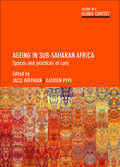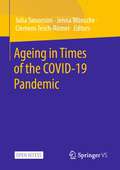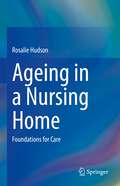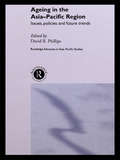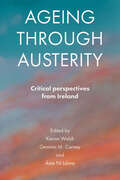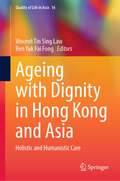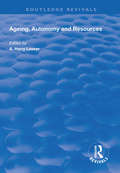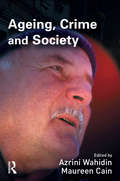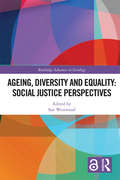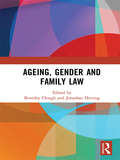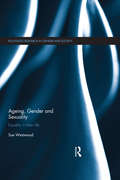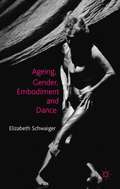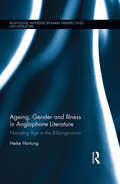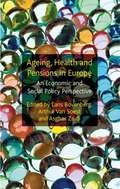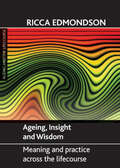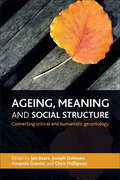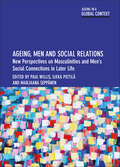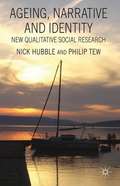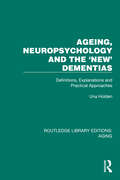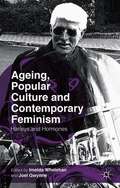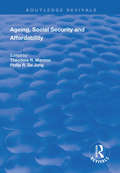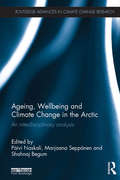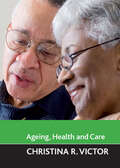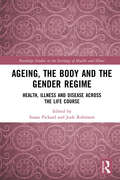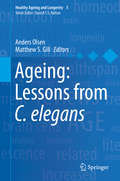- Table View
- List View
Ageing in Sub-Saharan Africa: Spaces and Practices of Care (Ageing in a Global Context)
by Jaco Hoffman and Katrien PypeThis collection of in-depth ethnographic analysis examines the impact of local and global transformations on the care, or lack of care, older people receive in Sub-Saharan Africa. This volume provides the pan-African evidence and analysis needed to move forward debates about how to address the long term care needs of this vulnerable population. Case studies from different regions of the continent (southern, central, east and west Africa) examine formal and informal care, including inter- and intra-generational care, retirement homes, care in the context of poverty, HIV/AIDS and migration.
Ageing in Times of the COVID-19 Pandemic
by Clemens Tesch-Römer Julia Simonson Jenna WünscheThis Open Access Book contains reports on the situation of people in the second half of life during the first year of the Covid-19 pandemic. The analyses are based on the German Ageing Survey (DEAS) and they provide insights on four main areas of life: income and work, subjective health and well-being, social support and loneliness as well as societal participation.This book is useful for scientists as well as political actors by directing attention to the risk groups that have been hard hit by the pandemic while also highlighting the resilience and adaptive capacities of many people in the second half of life.
Ageing in a Nursing Home: Foundations for Care
by Rosalie HudsonSpending the final chapter of your life in a nursing home is considered, by many, a fate worse than death. Others, however, have found that through enlightened, imaginative care even the frailest of lives can flourish. The key to such a transformation is to replace the constricting custodial centres of the past with a more informed, research-based approach. This book is timely, responding to evidence of the urgent need for change described in the Australian Royal Commission into Aged Care Quality and Safety Final Report: Care, Dignity and Respect and its predecessor subtitled Neglect. In this book, the author proposes a model of care that places the whole person at its centre, sidestepping the constraints of a reductionist funding model that focusses on residents' deficits – and the proprietor’s financial gain. Aged care requires a comprehensive research-based guide to fulfil this aim. Narratives are included throughout the book to reinforce the fact that nursing home care is about individual residents and their unique lives. Topics explored in various chapters include:· Ageing in a Changing Community· Social, Gerontological Care· A Palliative Approach· Community Expectations Ageing in a Nursing Home: Foundations for Care takes a realistic approach that draws on contemporary research and narratives from the unique lives of older Australians who, despite their frailty, teach us how to care. Such knowledge informs and influences their future. The book is a resource intended for all who have a stake in the provision of best practice residential aged care, and all who benefit from such care. Its academic appeal will include those who design and teach courses in aged care: gerontology, general practice medicine, nursing, attendant care, allied health, and chaplaincy. Academics and teachers will find useful, well-referenced material for their courses, together with ample scope for researchers.
Ageing in the Asia-Pacific Region: Issues, Policies and Future Trends (Routledge Advances in Asia-Pacific Studies)
by David R. PhillipsFirst Published in 2004. Routledge is an imprint of Taylor & Francis, an informa company.
Ageing through Austerity: Critical Perspectives from Ireland
by Edited by Kieran Walsh, Gemma M. Carney and Áine Ní LéimeDemographic ageing is identified as a global challenge with significant social policy implications. This book explores these implications, with a particular focus on the pressures and prospects for ageing societies in the context of austerity. The book presents a carefully crafted study of ageing in Ireland, one of the countries hardest hit by the Eurozone financial crisis. Providing a close, critical analysis of ageing and social policy that draws directly on the perspectives of older people, the text makes significant advances in framing alternatives to austerity-driven government policy and neoliberalism, giving a refreshing interdisciplinary account of contemporary ageing.
Ageing with Dignity in Hong Kong and Asia: Holistic and Humanistic Care (Quality of Life in Asia #16)
by Ben Yuk Fai Fong Vincent Tin Sing LawThis book advocates the application of holistic and humanistic approaches in elderly care and services to achieve the goal of ageing with dignity in Hong Kong and Asia. It responds to the needs of an increasing ageing population that has to deal with related health needs in long-term care, community health and social services, particularly for chronic conditions and psychosocial support. The book consists of three sections on policy and development of aged care, holistic and humanistic care for older adults, and capacity building for ageing with dignity, respectively. Topics include the latest initiatives in aged care, appropriate services and delivery models, lifestyle modification, psychosocial and environmental considerations, professional development, technologies, and social capital. The chapters review and discuss these issues within a global context, illustrated by examples from Asian countries, underpinned by locally based empirical research. Contributors include academics and practitioners from diversified professional backgrounds that include medicine, nursing, pharmacy, traditional Chinese medicine, dietetics, and allied health. The book traverses into territories in the social sciences, life sciences, and sports sciences, while also touching on areas of business and administration, hospitality, law, public policy, and information technology in connection with public health. The contents serve as a topical reference for tertiary studies in ageing and related disciplines such as well-being and are also useful to policymakers, community and public health practitioners, health executives and interns working in areas of policy and practice pertinent to care development, health delivery models, planning, quality, ethics, better health promotion, professional training, and monitoring for older adults.
Ageing, Autonomy and Resources (Routledge Revivals)
by A. Harry LesserFirst Published in 1999, lesser collects fourteen papers to create a discourse on the practical importance in a society where the proportion of elderly people is increasing. Exploring how autonomy and how it should be defined, and ethically when is it right to preserve a person’s autonomy and in comparison is it ever ethically right to bring elderly peoples autonomy as a secondary concern is it saves them from harm?
Ageing, Crime and Society
by Azrini Wahidin Maureen CainThe relationship between ageing and crime has been a much neglected issue, the focus rather being on youth. This books aims to redress this imbalance, bringing together a group of leading authorities to address key issues on the subject of crime and ageing, considering older people as both victims and perpetrators of crime, and looking too at conditions faced by older prisoners. The book draws upon both criminology and gerontology, as well as sociology and social policy, to help understand the complex relationship between ageing and the criminal justice system, and argues that the needs of elders must be far more firmly on the penal policy agenda than is the case currently. Ageing, Crime and Society will be concerned with 'unsilencing' a group who because of their age and status have been muted by the criminal justice system.
Ageing, Diversity and Equality: Social Justice Perspectives (Routledge Advances in Sociology)
by Sue WestwoodCurrent understandings of ageing and diversity are impoverished in three main ways. Firstly, with regards to thinking about what inequalities operate in later life there has been an excessive preoccupation with economic resources. On the other hand, less attention has been paid to cultural norms and values, other resources, wider social processes, political participation and community engagement. Secondly, in terms of thinking about the ‘who’ of inequality, this has so far been limited to a very narrow range of minority populations. Finally, when considering the ‘how’ of inequality, social gerontology’s theoretical analyses remain under-developed. The overall effect of these issues is that social gerontology remains deeply embedded in normative assumptions which serve to exclude a wide range of older people. Ageing, Diversity and Equality aims to challenge and provoke the above described normativity and offer an alternative approach which highlights the heterogeneity and diversity of ageing, associated inequalities and their intersections. The Open Access version of this book, available at https://www.taylorfrancis.com/books/9781351851329, has been made available under a Creative Commons Attribution-Non Commercial-No Derivatives 4.0 licence.
Ageing, Gender and Family Law
by Jonathan Herring Beverley CloughThis book explores the intersecting issues relating the phenomenon of ageing to gender and family law. The latter has tended to focus mainly on family life in young and middle age; and, indeed, the issues of childhood and parenting are key in many family law texts. Family life for older members has, then, been largely neglected; addressing this neglect, the current volume explores how the issues which might be important for younger people are not necessarily the same as those for older people. The significance of family, the nature of family life, and the understanding of self in terms of one’s relationships, tend to change over the life course. For example, the state may play an increasing role in the lives of older people – as access to services, involvement in work and the community, the ability to live independently, and to form or maintain caring relationships, are all impacted by law and policy. This collection therefore challenges the standard models of family life and family law that have been developed within a child/parent-centred paradigm, and which may require rethinking in the turn to family life in old age. Interdisciplinary in its scope and orientation, this book will appeal not just to academic family lawyers and students interested in issues around family law, ageing, gender, and care; but also to sociologists and ethicists working in these areas.
Ageing, Gender and Sexuality: Equality in Later Life (Routledge Research in Gender and Society)
by Sue WestwoodAgeing, Gender and Sexuality focuses on the experiences of older lesbian, gay and bisexual (LGB) individuals, in order to analyse how ageing, gender and sexuality intersect to produce particular inequalities relating to resources, recognition and representation in later life. The book adopts a feminist socio-legal perspective to propose that these inequalities are informed by and play out in relation to temporal, spatial and regulatory contexts. Discussing topics such as ageing sexual subjectivities, ageing kinship formations, classed trajectories and anticipated care futures, this book provides a new perspective on older individuals in same-sex relationships, including those who choose not to label their sexualities. Drawing upon recent empirical data, the book offers new theoretical approaches for understanding the intersectionality of ageing, gender and sexuality, as well as analysing the social policy implications of these findings. With an emphasis on the accounts of individuals who have experienced the dramatically changing socio-legal landscape for LGB people first-hand, this book is essential reading for students, scholars and policymakers working in the areas of: gender and sexuality studies; ageing studies and gerontology; gender, sexuality and law; equality and human rights; sociology; socio-legal studies; and social policy. Ageing, Gender and Sexuality won the Socio-Legal Studies Association (SLSA) Hart Prize for Early Career Academics for 2017.
Ageing, Gender, Embodiment and Dance
by Elisabeth SchwaigerThis book explores the nexus between gender, ageing and culture in dancers practicing a variety of genres. It challenges existing cultural norms which equate ageing with bodily decline and draws on an interdisciplinary theoretical framework to explore alternatives for developing a culturally valued mature subjectivity through the practice of dance.
Ageing, Gender, and Illness in Anglophone Literature: Narrating Age in the Bildungsroman (Routledge Interdisciplinary Perspectives on Literature)
by Heike HartungThis study establishes age as a category of literary history, delineating age in its interaction with gender and narrative genre. Based on the historical premise that the view of ageing as a burden emerges as a specific narrative in the late eighteenth century, the study highlights how the changing experience of ageing is shaped by that of gender. By reading the Bildungsroman as a 'coming of age' novel, the book asks how the telling of a life in time affects individual age narratives. Bringing together the different perspectives of age and disability studies, the book argues that illness is already an important issue in the Bildungsroman's narratives of ageing. This theoretical stance provides new interpretations of canonical novels, visiting authors such as Johann Wolfgang Goethe, Frances Burney, Maria Edgeworth, Jane Austen, Charles Dickens, George Eliot, Samuel Beckett, and Jonathan Franzen. Drawing on the link between age and illness in the Bildungsroman's age narratives, the genre of 'dementia narrative' is presented as one of the directions which the Bildungsroman takes after its classical period. Applying these theoretical perspectives to canonical novels of the nineteenth century and to the new genre of 'dementia narrative', the volume also provides new insights into literary and genre history. This book introduces a new theoretical approach to cultural age studies and offers a comprehensive analysis of the connection between narratology, literary theory, gender and age studies.
Ageing, Health and Pensions in Europe
by Lans BovenbergProviding an overview of the future research challenges for economists and social scientists concerning population ageing, pensions, health and social care in Europe, this book examines how scientific research can provide cutting-edge evidence on income security and well-being of the elderly, and labour markets and older workers.
Ageing, Insight and Wisdom: Meaning and Practice across the Lifecourse (Ageing and the Lifecourse)
by Ricca EdmondsonThis book focuses on older people as makers of meaning and insight, highlighting the evolving values, priorities and ways of communicating that make later life fascinating. It explores what creating ‘meaning’ in later life really implies, for older people themselves, for how to conceptualise older people and for relationships between generations. The book offers a language for discussing major types of lifecourse meaning, not least those concerning ethical and temporal aspects of the ways people interpret their lifecourses, the ways older people form part of social and symbolic landscapes, and the types of wisdom they can offer. It will appeal to students of gerontology, sociological methodology, humanistic sociology, philosophy, psychology, and health promotion and medicine.
Ageing, Meaning and Social Structure: Connecting Critical and Humanistic Gerontology
by Edited by Jan Baars, Joseph Dohmen, Amanda Grenier and Chris PhillipsonAgeing, meaning and social structure is a unique book advancing critical discourse in gerontology and makes a major contribution to understanding key social and ethical dilemmas facing ageing societies. It confronts and integrates approaches that have been relatively isolated from each other, and interrelates two major streams of thought within critical gerontology: analyses of structural issues in the context of political economy and humanistic perspectives on issues of existential meaning. The chapters, from a wide range of contributors, focus on major issues in ageing such as autonomy, agency, frailty, lifestyle, social isolation, dementia and professional challenges in social work and participatory research. This volume should be valuable reading for scholars and graduate students in gerontology and humanistic studies, as well as for policy makers and practitioners working in the field of ageing.
Ageing, Men and Social Relations: New Perspectives on Masculinities and Men’s Social Connections in Later Life
by Paul Willis, Ilkka Pietilä and Marjaana SeppänenWhile there has been a gradual increase in scholarship on men, ageing and masculinities, little attention has been paid to the social relations of men in later life and the implications for enhancing their social wellbeing and counteracting ageist discourse. Bringing together scholars in social gerontology and the social sciences from across Global North and South nations, this collection fills the gaps in key texts by foregrounding older men’s experiences. It provides new perspectives across the intersections of old age, ethnicities, class and sexual and gender identity, paying particular attention to older men from seldom heard or marginalised groups.
Ageing, Narrative and Identity
by Philip Tew Nick HubbleThis book outlines the methodology and results of the Fiction and the Cultural Mediation of Ageing Project, led by a research team from Brunel University, UK. It investigates how older people resist stereotypical cultural representations of ageing and demonstrates the importance of narrative understanding to social agency.
Ageing, Neuropsychology and the 'New' Dementias: Definitions, Explanations and Practical Approaches (Routledge Library Editions: Aging)
by Una HoldenUp to the 1990s, the influence of brain function disturbances and causes of dementia in the elderly had mostly been overlooked as a possible explanation for antisocial or unusual behaviour. As a result, these had tended not to be included in assessment and training programmes.
Ageing, Popular Culture And Contemporary Feminism
by Imelda Whelehan Joel GwynneHow has popular film, television and fiction responded to the realities of an ageing Western population? This volume analyses this field of representation to argue that, while celebrations of ageing as an inspirational journey are increasing, most depictions still focus on decline and deterioration.
Ageing, Social Security and Affordability (Routledge Revivals)
by Theodore R. Marmor Philip R. De JongFirst published in 1998. This volume (the second of a twin set grouping articles based on papers presented at seminars in Sigtuna, Sweden, during 1994 – 1996) deals with the largest spending programs of the welfare state – old age pensions and medical care, and their place within debates about the desirability and affordability of modern social programs. The volume is divided into four parts. The first part deals with general welfare state issues, cross-cutting themes and characterizations of whole systems within such diverse disciplines as social law, sociology and economics. Part two deals with old age pension reform. The countries discussed have widely different geographical, cultural and historical backgrounds. Part three takes up a number of interesting topics under the heading of health care reform. Part four deals with a substantial issue located and the juncture of aging, affordability, pensions and especially health care: increased longevity (and population aging) and the associated disability and frailty. What effect will these have on the future of modern welfare states?
Ageing, Wellbeing and Climate Change in the Arctic: An interdisciplinary analysis (Routledge Advances in Climate Change Research)
by Shahnaj Begum Marjaana Seppänen Paivi NaskaliThe Arctic and its unique natural resources have become objects of increasing concern. Rapid climate change and ageing of the population are transforming the living conditions in the region. This translates into an urgent need for information that will contribute to a better understanding of these issues. Ageing, Wellbeing and Climate Change in the Arctic addresses the important intersection of ageing, wellbeing and climate change in the Arctic region, making a key interdisciplinary contribution to an area of research on which little has been written, and limited sources of information are currently available. The book explores three key areas of discussion. First, various political issues that are currently affecting the Arctic, such as the social categorisation of elderly people. Second, the living conditions of the elderly in relation to Arctic climate change. Third, the wellbeing of elderly people in terms of traditional knowledge and lifestyles. The book also features contributions from a number of key researchers in the field which examine a broad range of case studies, including the impact of climate change on health in Lapland and elderly people and geographical mobility in Norway. This book will be of great interest to scholars of climate change, gerontology and social policy.
Ageing, health and care (Ageing and the Lifecourse)
by Christina R. VictorThe ageing of the population has enormous implications for the provision of, and access to, health care. Christina Victor's important textbook provides comprehensive overview of the experiences of older people, chapters on physical health, mental health, disability and lifestyle, a thesis of current policy developments, the key debates on the future health of elders and an international, up-to-date perspective. Written by a leader in the field, the book covers key questions such as the fitness of future older people, the widening inequalities in their health and whether health in old age is related to habits and behaviour in earlier life.
Ageing, the Body and the Gender Regime: Health, Illness and Disease Across the Life Course
by Susan Pickard Jude RobinsonThe current (postfeminist) gender order comprises a highly complex coexistence of old and new norms and expectations, freedom and constraints, within a neoliberal social order underpinned by individualism and involving a shift in gender performance by men and women. Health, illness and disease at different points in the life course can be used as a vehicle to illuminate structural and cultural inequalities that persist despite several decades of progressive reform in western countries. This collection brings together a number of key researchers, both established and new to the field, and based across North America, Australia, the UK and Europe, and comprises both empirical and theoretical work. Drawing on a wide range of disciplinary fields, including medical sociology, medical anthropology, nursing, gender studies, sociology of risk and age studies, all authors use heath, well-being, illness and disease as a lens through which to explore the complexities and inequalities associated with late modernity. This book will be of interest to scholars and students of age studies, medical sociology and anthropology, gender studies, healthcare and nursing.
Ageing: Lessons from C. elegans (Healthy Ageing and Longevity #5)
by Anders Olsen Matthew S. GillThis book brings together in one volume the current state of ageing research in the nematode Caenorhabditis elegans. The authors are leading researchers in the field, placing this topic in the context of human ageing, describing how and why basic discoveries in this simple organism have impacted our prospects for intervention in the ageing process. The authors cover a broad range of topics with regards to organismal and reproductive ageing including anatomical, physiological and biochemical changes, as well as genetic and environmental interventions that promote longevity and ameliorate age-related disease. Ageing is the single most important factor determining the onset of human disease in developed countries. With current worldwide demographic trends indicating that the number of individuals over the age of 65 will continue to rise, it is clear that an understanding of the processes that underpin ageing and age-related disease represents a key challenge in the biomedical sciences. In recent years there have been huge advances in our understanding of the ageing process and many of these have stemmed from genetic analysis of C. elegans. With no analogous book in this subject area this work will be of interest to a wide audience, ranging from academic researchers to the general public.
